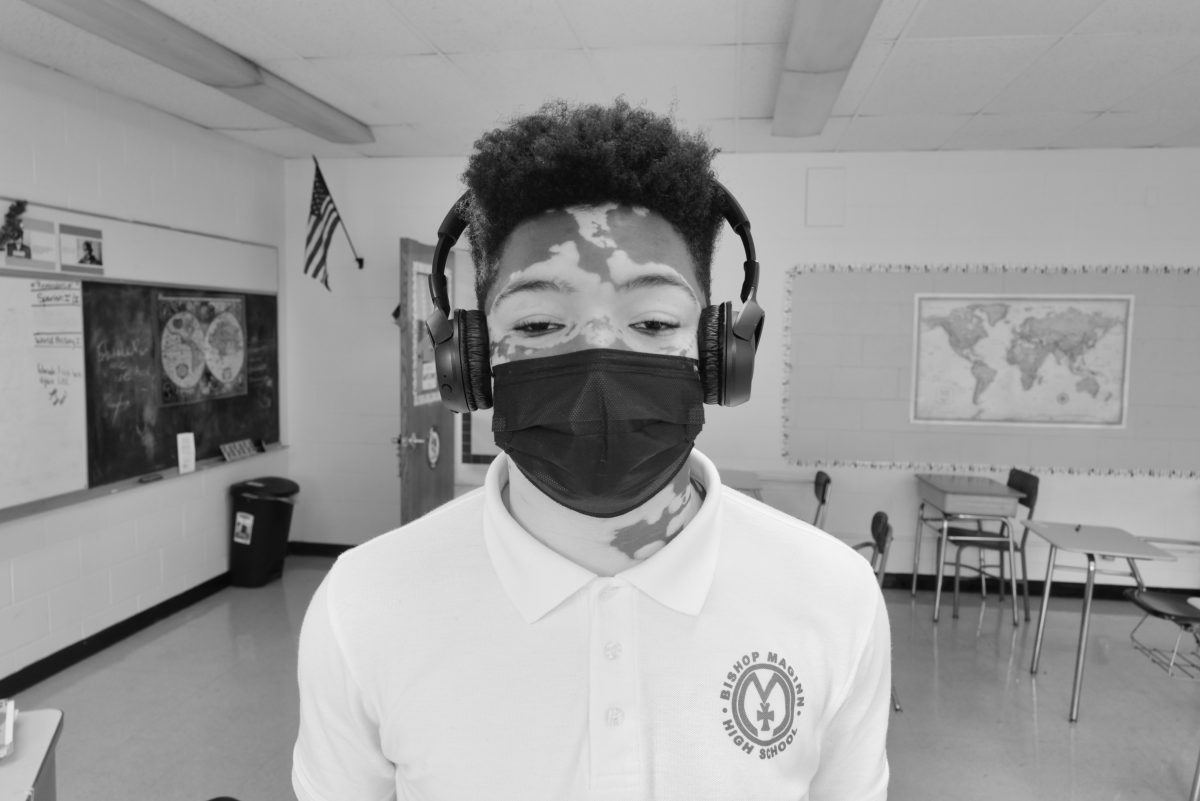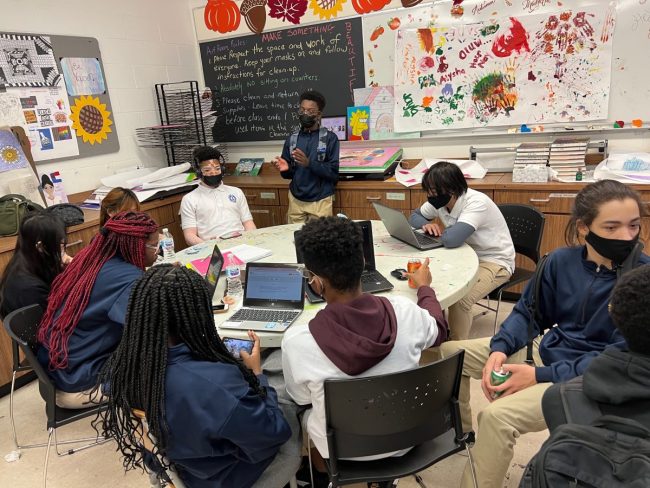(This is another in a series of articles on Bishop Maginn High School’s diverse students, many of whom have faced severe challenges and their lives. I talk to them to learn and share how they deal with adversity in their own words and see what they can teach us. They have taught me a lot.)
Turrell is 14, a freshman at Bishop Maginn. He has a younger brother and sister and another sister on the way. He exudes character and confidence. Friendship is very important to him.
He wanted to talk to me; he said he wanted to talk about how he dealt with his own challenge, a sudden change to the color of his face and skin when he was younger.
He wanted to let other kids know that this was painful and, at first, terrifying, but over time was something he had accepted and that does not now limit or threaten his life in any way now.
It is not something he dwells on or often thinks about.
Terrell has a skin condition called Vitiligo that causes lighter patches to form on the skin. While it can affect anyone in the general population, it is more noticeable in those with darker skin tones, including people of African American heritage.
Vitiligo can sometimes lead to social stigma and insecurity, but Terrell was too strong and determined to let that happen.
I find that the students who have suffered painful difficulties often cite one or both parents who tell them their problems do not define them and that they need to be strong and open and ask for help when they need it.
This advice seems to take hold, especially if offered kindly and in support.
“It hasn’t affected who I am,” Terrell told me as we sat in a classroom with a dozen students in the background, laughing and looking on their phones. “It hasn’t changed who I am, and I have no control over it, so there’s no point worrying about it.”
He stopped for a second to think about what he was saying. I was again surprised by how poised and articulate this young man is. I guess he’s a child, but he sure doesn’t act like one.
“I know one thing,” he said, “I don’t want to be dependent on people. I want to be the one who helps others, not the one who needs help,”
This struck me; I know so many older people who do not handle trouble as clearly or well. Bishop Maginn either attracts kids with character or builds character. Perhaps it does both.
Like most of the kids I interviewed, Terrell was uncertain initially, but then he warmed up and opened up.
This is their first interview, in most cases, and probably the last for many. I want them to feel good about it. I want to know what’s important to them, not what’s important to me.
I am in awe of the character that lives in these children and their maturity. I watch our so-called leaders in Washington, who are so often immature and without character, and I wonder how it is that these children – who have been through so much – are so much more adult and have such a strong sense of responsibility and morality.
I’ve heard the refugee students talk about murder, genocide, slaughter, the brutal life of refugee camps and their bloody and traumatic dislocation with the same distance and perspective: it doesn’t really matter now, it isn’t forgotten, but it isn’t what they are about either. They have moved well past their tormentors.
Perhaps it’s true that adversity builds character.
“Terrell is simply a wonderful addition to the Bishop Maginn family, ” says Sue Silverstein. “He is an excellent student, a diligent worker, and an unusually empathetic young adult. He has much to give to the world. He has never let his own struggles slow him or make him less compassionate. We are lucky to have him with us.”
When Terrell told me he was interested in politics, my heart sank a bit. One part of me thought he was just what we needed; another thought he didn’t deserve any fate as awful. I didn’t say that to him.
I told him that everybody says he has a lot of good friends.
How, I wondered, did he define friendship: “A friend is a person you can rely on. A friend won’t let you do stupid stuff; they won’t let you fall. That’s the kind of friend I want to be, and that’s the kind of friend I want to have.”
According to his teachers, he’s gotten his wish.
Ultimately, he said, the coloration of his skin is not something that should make you fall.
I’ve gotten to know Terrell at Bishop Maginn a bit – he and his friends always come and eat their lunch in Sue Silverstein’s art room – and he is, by all accounts, one of the most popular and respected students there, even halfway through his first year.
“Nobody cares about my skin,” he says, “They don’t care here. You have to pick your friends, I guess, and I have good ones.”
Terrell says he and his friends keep an eye on one another. One of his friends likes to try to skip a class now and then, “and I just say. No, you’re not going to do that.” That, he says, is what being a friend means.
He acknowledges how frightened he was when the vitiligo suddenly changed the color of his skin; he said he was terrified when he learned about it in the third grade.
No one was sure what it was or what caused it, and doctors are still uncertain about its specific origins.
He was tested repeatedly, given laser treatments and some skin transplants.
He is poised, articulate, and secure.
Terrell is candid and thoughtful about his skin coloration. He seems to have a solid perspective on it. He has never gone on Facebook to complain about it.
I imagined this could be the object of some social cruelty and teasing, but he says no one has ever teased him or made him feel uncomfortable at Bishop Maginn.
He works at a neighborhood daycare center in the summer, and sometimes the younger children ask him about it. He tells them what he has experienced. They rarely mention it again.
I take from Terrell and the other kids I’ve interviewed that the past need not define
us; it is just the past. We don’t need to give our lives to it.
Listening to Terrell and then looking over my notes, I thought of a passage from Mary Oliver’s wonderful poem from Blackwater Pond:
“What I want to say is that the past is the past,
and the present is what your life is
and you are capable of choosing what that will be, darling citizen.
So come to the pond or the river of your imagination,
or the harbor of your longing and put your lips to the world
And live your life.”
I think that’s just what Terrell, age 14, a freshman at Bishop Maginn High School, has decided to do. He fills me with hope.
___
As I’ve mentioned, I always conclude by asking the children I interview if we – the Army Of Good – can get anything for them that would advance their cultural or academic life. Most are reluctant to ask for anything or request something for the school. I gently persist, and after they give it some thought, they come around and ask for something personal. Terrell was very reluctant to ask for the thing he most needed – a laptop for school work and access to the Internet (he plans to go to college.) It was an hour after the interview before he came up to me and assured me a dozen times I didn’t need to do it. A well-reviewed and inexpensive laptop is on his way to him and will arrive on Monday. He deserves it.



I have vitiligo and live with it everyday so I know exactly how this young man feels!
Perhaps you have an encouraging word for him, Maureen..
beautiful child. beautiful outlook. amazing maturity. thank you for this well done interview! may he continue on with the same values and determination. inspirational!!
OUTSTANDING! In so many different ways.
So much wisdom, here, Jon.
“It hasn’t changed who I am, and I have no control over it, so there’s no point worrying about it.”
“I know one thing,” he said, “I don’t want to be dependent on people. I want to be the one who helps others, not the one who needs help,”
“A friend is a person you can rely on. A friend won’t let you do stupid stuff; they won’t let you fall. That’s the kind of friend I want to be, and that’s the kind of friend I want to have.”
“I take from Terrell and the other kids I’ve interviewed that the past need not define us; it is just the past. We don’t need to give our lives to it.”
Thank you to you and Terrell.
Winnie Harlow is a beautiful, successful model who has vitiligo. I’ve seen her interviewed and she is so beautiful, confident, an amazing young woman. I think she may be based in NYC. Wouldn’t it be cool if she gave the school a visit? On a whim, I’ll research it, if you think it’s something that would be welcome.
She co-hosts Amazon’s fashion shows on Amazon Prime..very charismatic and comfortable..